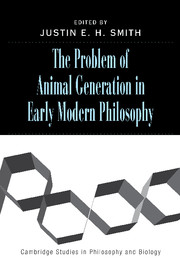The Problem of Animal Generation in Early Modern Philosophy
$51.99 ( ) USD
Part of Cambridge Studies in Philosophy and Biology
- Editor: Justin E. H. Smith, Concordia University, Montréal
- Date Published: June 2006
- availability: This ISBN is for an eBook version which is distributed on our behalf by a third party.
- format: Adobe eBook Reader
- isbn: 9780511217630
Find out more about Cambridge eBooks
$
51.99 USD
( )
Adobe eBook Reader
Other available formats:
Hardback, Paperback
Looking for an examination copy?
If you are interested in the title for your course we can consider offering an examination copy. To register your interest please contact [email protected] providing details of the course you are teaching.
-
This book examines the early modern science of generation, which included the study of animal conception, heredity, and fetal development. Analyzing how it influenced the contemporary treatment of traditional philosophical questions, it also demonstrates how philosophical presuppositions about mechanism, substance, and cause informed the interpretations offered by those conducting empirical research on animal reproduction. Composed of cutting-edge essays written by an international team of leading scholars, the book offers a fresh perspective on some of the basic problems in early modern philosophy.
Read more- First collective work devoted exclusively to the problem of animal generation in early modern philosophy and science
- On the cutting edge of the burgeoning scholarly interest, particularly among historians of philosophy, in early modern life science
- Includes work by a team of leading international scholars
Reviews & endorsements
"This rich volume aims at helping historians “to gain a fresh perspective on some of the basic problems of early modern philosophy,” by studying how these problems manifest themselves in discussions of animal generation.... the volume can easily be recommended to historians of early modern philosophy and experts alike."
--S a n d e r W. d e B o e r, Journal of the History of PhilosophyCustomer reviews
Not yet reviewed
Be the first to review
Review was not posted due to profanity
×Product details
- Date Published: June 2006
- format: Adobe eBook Reader
- isbn: 9780511217630
- availability: This ISBN is for an eBook version which is distributed on our behalf by a third party.
Table of Contents
Part I. The Dawning of a New Era:
1. The comparative study of animal development: from Aristotle to William Harvey J. G. Lennox
2. Monsters, nature, and generation from the Renaissance to the Early Modern period: the emergence of medical thought Annie Bitbol-Hesperies
Part II. The Cartesian Programme:
3. Descartes' experiments and the generation of animals Vincent Aucante
4. Imagination and the problem of heredity in Cartesian embryology Justin E. H. Smith
Part III. The Gassdendian Alternative:
5. The soul as vehicle for genetic information: Pierre Gassendi's account of inheritance Saul Fisher
6. Atoms and minds in Walter Charleton's theory of animal generation Andreas Blank
Part IV. Second-Wave Mechanism and the Return of Animal Souls, 1650–1700:
7 Animal generation and substance in Sennert and Leibniz Richard T. W. Arthur
8. Malebranche on animal generation: pre-existence and the microscope Andrew J. Pyle
9. Spontaneous and sexual generation in Ann Conway's Principles Deborah Boyle
10 'Animal' as category: Pierre Bayle's 'Rorarius' Dennis Des Chene
Part V. Between Epigenesis and Pre-Existence: The Debate Intensifies, 1700–70:
11. Method and cause: the Cartesian context of the Haller-Wolff debate Karen Detlefsen
12. Soul power: G. E. Stahl and the debate on animal generation Francesco Paolo di Ceglia
13. Charles Bonnet's neo-Leibnizian theory of organic bodies Francois Duchesneau
Part VI. Kant and His Contemporaries on Development and the Problem of Organized Matter:
14. Kant's early views on epigenesis: the role of Maupertuis John Zammito
15. Blumenbach and Kant on the formative drive: mechanism and teleology in nature Brandon Look
16. Kant and the speculative sciences of origins Catherine Wilson
17. Kant and evolution Michael Ruse.
Sorry, this resource is locked
Please register or sign in to request access. If you are having problems accessing these resources please email [email protected]
Register Sign in» Proceed
You are now leaving the Cambridge University Press website. Your eBook purchase and download will be completed by our partner www.ebooks.com. Please see the permission section of the www.ebooks.com catalogue page for details of the print & copy limits on our eBooks.
Continue ×Are you sure you want to delete your account?
This cannot be undone.
Thank you for your feedback which will help us improve our service.
If you requested a response, we will make sure to get back to you shortly.
×

